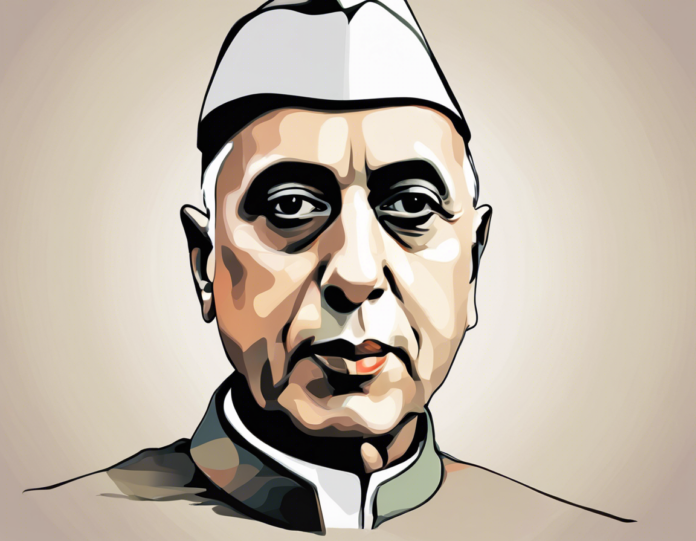Born on November 14, 1889, in Allahabad, India, Pandit Jawaharlal Nehru was a prominent leader in the Indian independence movement and the first Prime Minister of independent India. Often referred to as the architect of modern India, Nehru’s legacy as a visionary leader continues to shape the country’s political, social, and economic landscape.
Early Life and Education
Nehru hailed from a privileged background, with his father, Motilal Nehru, being a prominent lawyer and nationalist leader. Educated in England at Harrow School and later at Trinity College, Cambridge, Nehru was exposed to Western political thought and ideas that would influence his own vision for India’s future.
Role in the Independence Movement
Nehru was deeply influenced by Mahatma Gandhi’s philosophy of nonviolent resistance and civil disobedience. He became an active member of the Indian National Congress and played a crucial role in the fight against British colonial rule. His eloquence, charismatic leadership, and commitment to secularism and social justice made him a popular figure among the Indian masses.
Vision for India’s Future
As India’s first Prime Minister, Nehru outlined a vision for a socialist, secular, and democratic country. His policies focused on industrialization, economic development, education, and social welfare. The Five-Year Plans, initiated during his tenure, laid the foundation for India’s industrial growth and self-sufficiency.
Nonalignment and Foreign Policy
Nehru was a leading proponent of the Non-Aligned Movement, advocating for an independent foreign policy that refused to align with either the Western bloc led by the United States or the Eastern bloc led by the Soviet Union. His vision of nonalignment and peaceful coexistence continues to shape India’s foreign policy to this day.
Legacy and Impact
Nehru’s legacy as a visionary leader is evident in India’s democratic institutions, commitment to secularism, and emphasis on education and scientific research. The establishment of prestigious institutions such as the Indian Institutes of Technology (IITs) and the Indian Institutes of Management (IIMs) reflects his emphasis on scientific temper and rational thinking.
Challenges and Criticisms
While Nehru’s contributions to India’s development are widely acknowledged, he also faced criticism for certain policies, such as his approach to Kashmir and China. The legacy of Nehruvian socialism has been a subject of debate, with some questioning its impact on India’s economic growth and development.
Continuing Relevance
Despite the passage of time, Nehru’s vision for India as a secular, democratic, and socialist republic remains relevant. His emphasis on education, scientific temper, and social justice continues to guide the country’s progress in the 21st century.
Conclusion
In conclusion, Pandit Jawaharlal Nehru’s legacy as a visionary leader and architect of modern India is indelible. His commitment to democracy, secularism, and social justice continues to inspire generations of Indians. As the country navigates its journey towards becoming a global power, Nehru’s vision of a progressive and inclusive India serves as a guiding light for the nation’s future.
Frequently Asked Questions (FAQs)
- What were some of Jawaharlal Nehru’s major achievements as Prime Minister of India?
-
Nehru’s major achievements include initiating the Five-Year Plans for economic development, promoting secularism and democracy, and laying the foundation for India’s scientific and technological progress.
-
What was Nehru’s role in the Indian independence movement?
-
Nehru was a key leader in the Indian National Congress and played a pivotal role in advocating for independence from British colonial rule through nonviolent resistance.
-
What is the significance of Nehru’s foreign policy of nonalignment?
-
Nehru’s foreign policy of nonalignment allowed India to maintain its independence and sovereignty during the Cold War era by refusing to align with either the Western or Eastern bloc.
-
How did Nehru contribute to India’s education system?
-
Nehru was instrumental in establishing prestigious institutions like the IITs and IIMs to promote scientific education and research in India.
-
What were some of the criticisms faced by Nehru during his tenure as Prime Minister?
-
Nehru faced criticism for his handling of the Kashmir issue and the border conflict with China. Some also questioned the efficacy of Nehruvian socialism in promoting economic growth.
-
How has Nehru’s legacy influenced modern India?
-
Nehru’s legacy can be seen in India’s democratic institutions, commitment to secularism, and emphasis on education and social welfare. His vision continues to shape the country’s policies and development agenda.
-
What was Nehru’s vision for India’s industrial and economic growth?
-
Nehru focused on industrialization and economic development through the Five-Year Plans, which aimed at promoting self-sufficiency and reducing poverty in India.
-
Did Nehru have any notable achievements in the field of international relations?
-
Nehru’s advocacy for nonalignment and peace diplomacy positioned India as a leader in the global arena and earned him respect among world leaders.
-
How did Nehru contribute to shaping India’s cultural identity?
-
Nehru’s promotion of secularism and cultural diversity helped in shaping India’s identity as a pluralistic and inclusive society, where all religions and communities have equal rights.
-
What lessons can be drawn from Nehru’s leadership for today’s political leaders?
- Nehru’s commitment to democracy, secularism, and social justice serves as a valuable lesson for political leaders today, emphasizing the importance of inclusive governance and sustainable development for the nation.


Recent comments